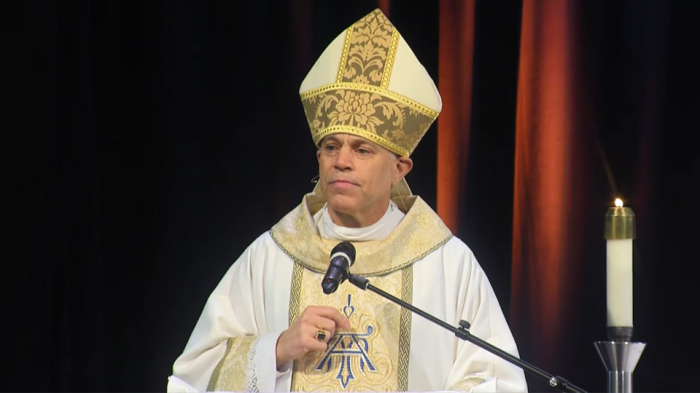
A prominent leader in the American Catholic Church known for feuding with one of the most powerful political figures in the United States has been appointed to the advisory board of President Donald Trump’s newly formed Religious Liberty Commission.
In a statement published Thursday, the Roman Catholic Archdiocese of San Francisco announced that Trump had appointed Archbishop Salvatore Cordileone to serve on the advisory board of his new Religious Liberty Commission.
Trump announced the formation of the commission at the White House earlier this month on the National Day of Prayer, noting that it would include 14 members and an advisory board consisting of no more than 15 religious leaders.
“Religious liberty is a critical issue in our time that needs to be defended and addressed,” Cordileone said in reaction to his appointment. “I am happy to join my brother bishops in providing a Catholic voice on this important topic at a national level.”
Two other Catholic bishops were appointed to the Religious Liberty Commission — Bishop Robert Barron of the Diocese of Winona-Rochester and Cardinal Timothy Dolan of the Archdiocese of New York. Two additional Catholic bishops were appointed to the advisory board — Bishop Thomas Paprocki of the Diocese of Springfield in Illinois and Bishop Kevin Rhoades of the Diocese of Fort Wayne-South Bend in Indiana.
Other appointees to the advisory board, as outlined in a statement published by The White House Friday, include Pastor Jentezen Franklin of Free Chapel in Gainesville, Georgia, Archbishop Elpidophros of the Greek Orthodox Church’s Archdiocese of America, Father Thomas Ferguson of Good Shepherd Parish in Alexandria, Virginia, Pastor Jack Graham of Prestonwood Baptist Church in Dallas, Texas, and four rabbis.
The stated purpose of the commission, as outlined in an executive order signed by Trump on May 1, is to produce a “comprehensive report on the foundations of religious liberty on American society, current threats to domestic religious liberty, strategies to preserve and enhance religious liberty protections for future generations, and programs to increase awareness of and celebrate America’s peaceful religious pluralism.”
The commission will also recommend “steps to secure domestic religious liberty by executive order or legislative actions” as well as “identifying opportunities for the White House Faith Office to partner with the ambassador at-large for international religious freedom to further the cause of religious liberty around the world.”
Trump indicated at the White House ceremony establishing the commission that he wants its members to serve through at least July 4, 2026, the 250th anniversary of the signing of the Declaration of Independence.
Cordileone has received national attention in recent years for his clash with former U.S. House Speaker Nancy Pelosi, D-Calif., over her reception of communion despite her strong advocacy in favor of legalized abortion, which directly contradicts the teachings of the Catholic Church.
Pelosi’s congressional district is located within the Archdiocese of San Francisco.
In a May 2021 letter to pro-abortion Catholics, Cordileone wrote, “If you find that you are unwilling or unable to abandon your advocacy for abortion, you should not come forward to receive Holy Communion.”
“To publicly affirm the Catholic faith while at the same time publicly rejecting one of its most fundamental teachings is simply dishonest,” Cordileone insisted.
A year later, Cordileone wrote a letter to Pelosi banning the then-House speaker from receiving communion in the archdiocese.
“You are not to present yourself for Holy Communion and, should you do so, you are not to be admitted to Holy Communion, until such time as you publicly repudiate your advocacy for the legitimacy of abortion and confess and receive absolution of this grave sin in the sacrament of Penance,” Cordileone wrote.
Last December, more than two years after Cordileone’s letter to Pelosi, the former speaker told The National Catholic Reporter that she “received communion anyway.”
“My Catholic faith is, Christ is my savior,” she said. “It has nothing to do with the bishops.”
The push to ban pro-abortion Catholic politicians from receiving communion received much attention during the presidency of Joe Biden, a practicing Catholic and an outspoken supporter of legal access to abortion. Supporters of banning pro-abortion politicians from receiving communion cite a 2004 letter written by then-Cardinal Joseph Ratzinger, who would later become Pope Benedict XVI, as the reason why it is necessary to do so.
“When a person’s formal cooperation becomes manifest (understood, in the case of a Catholic politician, as his consistently campaigning and voting for permissive abortion and euthanasia laws,) his Pastor should meet with him, instructing him about the Church’s teaching, informing him that he is not to present himself for Holy Communion until he brings to an end the objective situation of sin, and warning him that he will otherwise be denied the Eucharist,” Ratzinger wrote.
“When ‘these precautionary measures have not had their effect …,’ and the person in question, with obstinate persistence, still presents himself to receive the Holy Eucharist, ‘the minister of Holy Communion must refuse to distribute it,'” the letter stated.
The Catholic Church’s Code of Canon Law teaches that those “obstinately persevering in manifest grave sin are not to be admitted to Holy Communion.”
Ryan Foley is a reporter for The Christian Post. He can be reached at: ryan.foley@christianpost.com


















